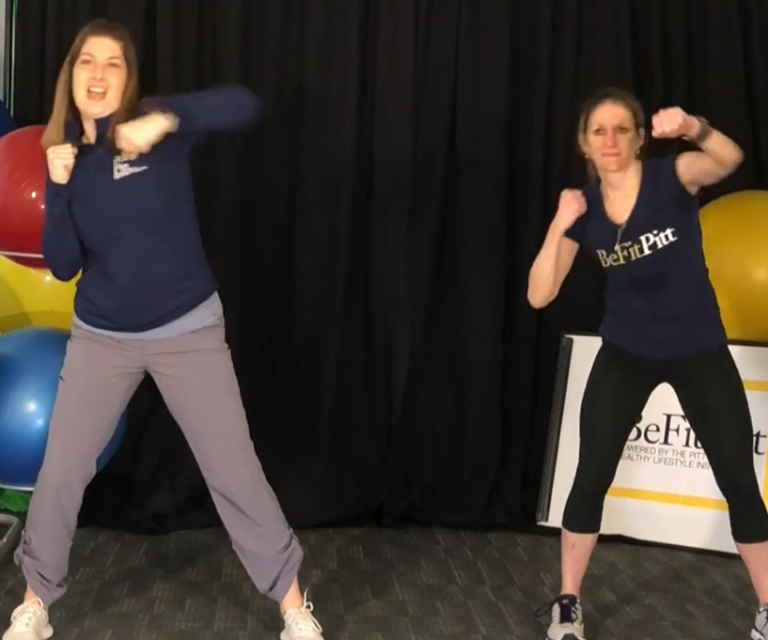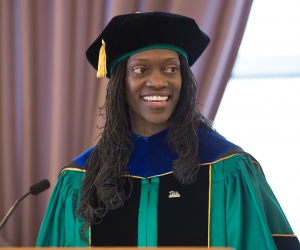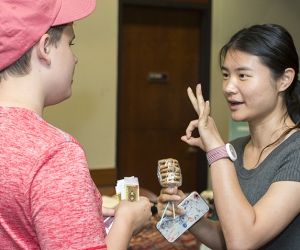
School Maintains Sense of Community Amid Pandemic
When the COVID-19 pandemic swept across the United States, higher education institutions across the country were forced to quickly respond with proactive measures, including moving courses to remote learning and directing faculty and staff to work from home.
The University of Pittsburgh School of Education has practiced resilience in the face of the challenges that arise from entirely remote operations. Through a holistic approach of care and development, the school community has stepped up with creative solutions to support the physical, mental, and academic needs of the school community.
Professors Pivot to Virtual Classes
For professors who rely on interactive class styles, like Higher Education associate professor Gina Garcia, the sudden switch to online classes presented challenges.
“Student presentations and small group discussions play a central role in my pedagogy, so those were my biggest concerns. Luckily, Zoom video-conferencing works well for both,” said Garcia. “I like to have the students write on the chalkboard during class, so I screenshared a website called Padlet to recreate the experience of having students contribute information on a ‘board’ that the whole class can see.”
To add a small bit of whimsy to the experience, Garcia held a “costume-on-top day” for her first virtual class. She got the idea from a Facebook group where professors discussed online delivery strategies. Students signed into her class wearing princess tiaras, animal ears, and feather boas, before proceeding to launch into serious discussion about systemic barriers to educational equity in post-secondary education.
Courtney Ross, a Higher Education master’s student and an administrative assistant in the School of Education, said that it felt like Garcia’s class followed the structure of a normal lecture. “I still feel like I’m learning and getting the content,” said Ross.
Be Fit Pitt Keeps University Moving
In response to the crisis, the Be Fit Pitt team at the School of Education’s Healthy Lifestyle Institute quickly produced an at-home workout video series to help people stay physically active during a time of physical distancing and working from home.
In the first two weeks, the team churned out 14 YouTube videos in its new “MOVE IT with BE FIT PITT” series. The videos bolstered an impressive library of content that includes over 700 videos on the channel.
Several Graduate Student Assistants and Programming staff members have pitched in to design workouts for the videos, which are intended to be accessible to all skill levels.
“We are passionate about making physical activity accessible for everyone,” said Renee Rogers, an associate professor and programming director at the Healthy Lifestyle Institute. Many of the exercises in the videos include variations so that both beginners and advanced participants can follow along comfortably. Several activities also include both seated and standing versions of varying intensities.
Rogers leads the exercises in the videos. As gyms close and group fitness classes are cancelled, Rogers encourages people to “shift your thinking away from the idea that you can’t be active if you can’t go to the gym.”
“When you are physical distancing, you may be sitting a lot more than expected. The videos can help you break up sitting time and use your body in a positive and active way,” said Rogers. She also emphasized the importance of physical activity to support the immune system and mental wellbeing.
“Even in short bouts, physical activity has been shown to assist with improving mood and may lead to increased alertness and productivity,” said Rogers.
Be Fit Pitt has spread the word about their videos through their Twitter account. Beginning Monday, April 6, Be Fit Pitt will begin live-streaming workouts four times per day on weekdays. Those who are interested may find the Zoom links for these workouts as virtual events on the University calendar.
Doctoral Candidates Defend Dissertations Online
For doctoral candidates, defending their thesis is the culmination of their graduate work. Many look forward to the event as a shining moment in their academic career.
One week before she was scheduled to defend, PhD candidate Qiana Lachaud received confirmation that she would have to rework her defense to an online format. Her thesis topic was “Combating epistemological racism: critical race participatory action research towards the promotion of faculty critical race conscience and transformative pedagogy.” With limited time to make the transition, Lachaud planned to defend over Zoom, a video meeting platform that has become increasingly popular during the time of physical distancing.
Including committee members, 13 people joined in on the Zoom call.
“It was actually nice to have the comfort and security of doing it from home,” said Lachaud. “Some of my family members, who would not have been able to travel to Pittsburgh, were able to come since it was online.”
Lachaud successfully defended her thesis and now holds a PhD in Social and Comparative Analysis in Education.
Virtual Coffee Chats Build Sense of Community
Marijke Hecht was the first in the School of Education to defend a dissertation online earlier this month. While attending Hect’s virtual dissertation defense, third-year Social and Comparative Analysis in Education PhD student Emily Koren remembers chatting briefly before and after the dissertation. “It was really nourishing,” she said.
Wanting to recreate a sense of community on a virtual platform, Koren was inspired to create Ch@t & Check-Ins, which are a series of Zoom sessions where School of Education folks could drop by and connect. “I greatly value the informal interactions that I have with people in the school,” said Koren. “The interactions that come from just bumping into people in the hallways are an important dimension to the School of Education. We have this positive energy and momentum; we’re not going to let that be lost because of a pandemic.”
“Just because we’re practicing physical distance doesn’t mean we have to stop socially interacting,” said added.
The virtual chats have no formal agenda; rather, they serve as a space for people to organically share how they are doing with each other. They last about 30 minutes, although participants are welcome to “pop in” at any time.
Nine people attended the first session, including a mix of current and future students, staff, and faculty. The participants chatted about a variety of topics, from their favorite novelists to their ideas for equity and justice during a crisis. The virtual chats will continue through April and more may be added in May.
EdD Program Holds Online Orientation
When Tom Akiva learned he could not host an in-person orientation for the School of Education’s EdD program, he only had two weeks to pull together a virtual alternative on Zoom. His team quickly got to work.
The Zoom meeting hosted 86 participants, including 65 accepted students and 11 faculty, staff, and current students. Like orientations in past years, there were introductions from staff and faculty, a panel of current students, and an information session about student services.
Renée and Richard Goldman Dean Valerie Kinloch and Associate Dean of Equity and Justice Leigh Patel also made appearances through welcome videos.
Although he would have preferred the face-to-face experience, Akiva says there were positive aspects of the virtual format. “The chat feature made it so that anyone could type a question without having to talk in front of the group, which was equalizing. We had a steady stream of questions coming into the chat that we were able to answer.”
“Ten years ago we couldn’t have done this at all,” said Akiva. “This whole emergency happened at a time when our technology is just good enough.”




